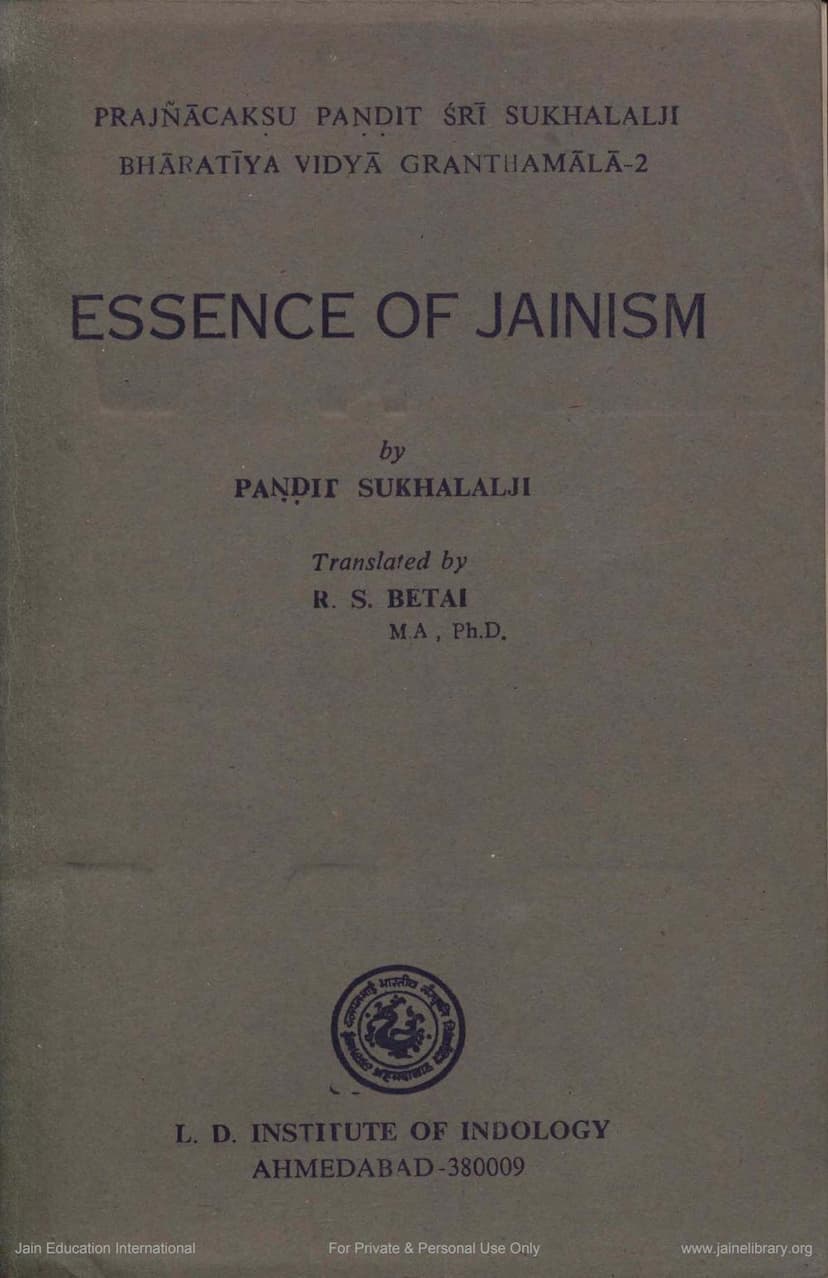Essence Of Jainism
Added to library: September 1, 2025

Summary
This comprehensive summary of "Essence of Jainism" by Pandit Sukhlal Sanghavi, translated by R.S. Betai, provides a deep dive into the core tenets and historical context of Jainism. The book, published by the L.D. Institute of Indology, Ahmedabad, offers a detailed exploration of Jain philosophy, religion, and culture, aimed at providing readers with an authentic understanding of this ancient Indian tradition.
Key Themes and Concepts:
-
The Nature of Religion and Philosophy: The book begins by establishing the inseparable link between philosophy and religion, defining philosophy as the pursuit of truth and religion as the way of life derived from those truths. It emphasizes the importance of an open mind and fearlessness in the search for truth, identifying this as the true meaning of religion.
-
The Origin and Aim of Religion: Religion is traced back to the fundamental desire for life, happiness, and the avoidance of suffering, which leads to a natural inclination for community living and mutual support. The ultimate aim of religion is presented as the realization of individual and social duties, fostering a sense of responsibility.
-
Universal Wealth and Two Forms of Religion: Religion is described as a universal wealth, with streams of religious thought flowing through different individuals and enriching society. Religion is presented in two forms: the external (scriptures, rituals, holy places) and the internal (virtues like truth, love, selflessness). While external forms may vary, the internal essence remains constant.
-
The Brahmana and Śramana Traditions: A significant portion of the book is dedicated to contrasting the Brahmana (Vedic) tradition with the Śramana tradition, of which Jainism is a prominent part. The Brahmana tradition is characterized by inequality, emphasis on worldly prosperity (abhyudaya) achieved through ritualism (sacrifices), and the superiority of the priestly class. In contrast, the Śramana tradition emphasizes equality, detachment, and the ultimate aim of liberation (nihśreyasa). This fundamental difference led to historical opposition between the two traditions.
-
The Essence of Jainism (Nirgrantha Dharma): Jainism, also known as Nirgrantha Dharma (meaning "unfettered" or "without bonds"), is presented as a Śramana dharma with unique characteristics. It emphasizes detachment, non-violence (Ahimsa), and a spirit of equality, extending its ethical principles to all living beings.
-
Non-Violence (Ahimsa) and Non-Extremism (Anekānta): Ahimsa is identified as the core principle of Jainism, practiced through self-control and austerity. The doctrine of Anekānta (non-absolutism) is presented as a logical outcome of the emphasis on equality, advocating for the consideration of multiple viewpoints. This principle underlies Syadvāda (the doctrine of conditional predication) and Nayavāda (the doctrine of partial standpoints).
-
Karma and Spiritual Evolution: The book delves into the Jain understanding of Karma (Karmavāda), explaining it as the cause of rebirth and the mechanism that shapes an individual's destiny. It details the concept of liberation (Moksha) as the ultimate goal, achieved through stages of spiritual development (Gunasthānas) and the annihilation of karma. The Jain perspective on karma is presented as intricate, explaining the relationship between the soul (Jiva) and material substances (Ajiva).
-
Celibacy (Brahmacharya): Celibacy is discussed as a significant aspect of Jain discipline, defined broadly as complete self-control extending to the mind, speech, and body. It is viewed as a means to attain liberation, with a nuanced understanding of its practice for both ascetics and householders.
-
Āvaśyaka Kriyā: The six essential daily duties (Āvaśyaka Kriyā) are explained as crucial practices for spiritual purification and development, emphasizing equanimity (Sāmāyika), veneration (Vandana), penance (Pratikramana), meditation (Kayotsarga), and renunciation (Pratyakhyāna).
-
Pancaparameṣṭhi: The five supreme beings in Jainism—Arihanta, Siddha, Ācārya, Upādhyāya, and Sadhu—are explained, highlighting their distinct spiritual statuses and the philosophical basis for their veneration. The concept of God in Jainism is understood as the perfected state of the soul, attainable by all.
-
The Theory of Non-Absolutism (Anekānta) and Nayavāda: Anekānta is presented as the cornerstone of Jain philosophy, advocating for understanding reality from multiple perspectives. Nayavāda, the doctrine of viewpoints, is the method through which Anekānta is articulated, acknowledging that truth is multifaceted and can be approached from various angles.
-
Saptabhangi (Sevenfold Judgment): This logical framework, derived from Nayavāda, demonstrates how seemingly contradictory statements about an object can coexist when viewed from different perspectives. It highlights the complexity and non-absolutist nature of reality.
-
Brahma and Sama: The book explores the concepts of "Sama" (equanimity, introspection, the internal focus of the Śramana tradition) and "Brahma" (the external focus on the universe and its perceived divine forces, as seen in the Brahmana tradition). It argues for an ultimate convergence of these two streams towards Supreme Reality, emphasizing unity despite apparent differences.
-
Four Institutions: The organizational structure of Jainism is discussed, focusing on the four Sanghas (ascetics and householders, both male and female), the disciplined life of ascetics, the importance of holy places (Tirthas), and the meticulous preservation of knowledge through vast libraries (Bhandars).
-
Paryusana and Samvatsari: The significance of Jain festivals, particularly Paryusana and Samvatsari, is explained. These festivals are not for worldly gain but for spiritual purification, self-reflection, austerity, and fostering a spirit of forgiveness and non-violence.
Overall Contribution:
"Essence of Jainism" provides a scholarly and accessible overview of Jainism. Pandit Sukhlal Sanghavi's deep scholarship is evident in the detailed exposition of Jain philosophy, ethics, and historical context. The translation by R.S. Betai ensures that these profound concepts are conveyed clearly to an English-speaking audience. The book serves as an invaluable resource for anyone seeking a comprehensive and authentic understanding of Jainism, its philosophical depth, and its practical application in life. It highlights Jainism's emphasis on individual spiritual development, non-violence, and the pursuit of truth through a balanced and multifaceted approach.